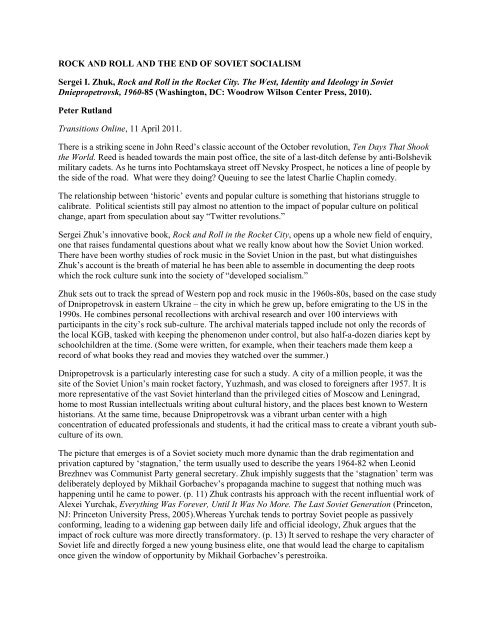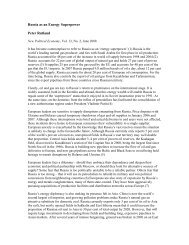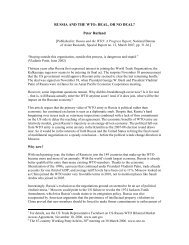Rock and roll and th.. - Peter Rutland, Wesleyan University
Rock and roll and th.. - Peter Rutland, Wesleyan University
Rock and roll and th.. - Peter Rutland, Wesleyan University
Create successful ePaper yourself
Turn your PDF publications into a flip-book with our unique Google optimized e-Paper software.
ROCK AND ROLL AND THE END OF SOVIET SOCIALISMSergei I. Zhuk, <strong>Rock</strong> <strong>and</strong> Roll in <strong>th</strong>e <strong>Rock</strong>et City. The West, Identity <strong>and</strong> Ideology in SovietDniepropetrovsk, 1960-85 (Washington, DC: Woodrow Wilson Center Press, 2010).<strong>Peter</strong> Rutl<strong>and</strong>Transitions Online, 11 April 2011.There is a striking scene in John Reed‟s classic account of <strong>th</strong>e October revolution, Ten Days That Shook<strong>th</strong>e World. Reed is headed towards <strong>th</strong>e main post office, <strong>th</strong>e site of a last-ditch defense by anti-Bolshevikmilitary cadets. As he turns into Pochtamskaya street off Nevsky Prospect, he notices a line of people by<strong>th</strong>e side of <strong>th</strong>e road. What were <strong>th</strong>ey doing? Queuing to see <strong>th</strong>e latest Charlie Chaplin comedy.The relationship between „historic‟ events <strong>and</strong> popular culture is some<strong>th</strong>ing <strong>th</strong>at historians struggle tocalibrate. Political scientists still pay almost no attention to <strong>th</strong>e impact of popular culture on politicalchange, apart from speculation about say “Twitter revolutions.”Sergei Zhuk‟s innovative book, <strong>Rock</strong> <strong>and</strong> Roll in <strong>th</strong>e <strong>Rock</strong>et City, opens up a whole new field of enquiry,one <strong>th</strong>at raises fundamental questions about what we really know about how <strong>th</strong>e Soviet Union worked.There have been wor<strong>th</strong>y studies of rock music in <strong>th</strong>e Soviet Union in <strong>th</strong>e past, but what distinguishesZhuk‟s account is <strong>th</strong>e brea<strong>th</strong> of material he has been able to assemble in documenting <strong>th</strong>e deep rootswhich <strong>th</strong>e rock culture sunk into <strong>th</strong>e society of “developed socialism.”Zhuk sets out to track <strong>th</strong>e spread of Western pop <strong>and</strong> rock music in <strong>th</strong>e 1960s-80s, based on <strong>th</strong>e case studyof Dnipropetrovsk in eastern Ukraine – <strong>th</strong>e city in which he grew up, before emigrating to <strong>th</strong>e US in <strong>th</strong>e1990s. He combines personal recollections wi<strong>th</strong> archival research <strong>and</strong> over 100 interviews wi<strong>th</strong>participants in <strong>th</strong>e city‟s rock sub-culture. The archival materials tapped include not only <strong>th</strong>e records of<strong>th</strong>e local KGB, tasked wi<strong>th</strong> keeping <strong>th</strong>e phenomenon under control, but also half-a-dozen diaries kept byschoolchildren at <strong>th</strong>e time. (Some were written, for example, when <strong>th</strong>eir teachers made <strong>th</strong>em keep arecord of what books <strong>th</strong>ey read <strong>and</strong> movies <strong>th</strong>ey watched over <strong>th</strong>e summer.)Dnipropetrovsk is a particularly interesting case for such a study. A city of a million people, it was <strong>th</strong>esite of <strong>th</strong>e Soviet Union‟s main rocket factory, Yuzhmash, <strong>and</strong> was closed to foreigners after 1957. It ismore representative of <strong>th</strong>e vast Soviet hinterl<strong>and</strong> <strong>th</strong>an <strong>th</strong>e privileged cities of Moscow <strong>and</strong> Leningrad,home to most Russian intellectuals writing about cultural history, <strong>and</strong> <strong>th</strong>e places best known to Westernhistorians. At <strong>th</strong>e same time, because Dnipropetrovsk was a vibrant urban center wi<strong>th</strong> a highconcentration of educated professionals <strong>and</strong> students, it had <strong>th</strong>e critical mass to create a vibrant you<strong>th</strong> subcultureof its own.The picture <strong>th</strong>at emerges is of a Soviet society much more dynamic <strong>th</strong>an <strong>th</strong>e drab regimentation <strong>and</strong>privation captured by „stagnation,‟ <strong>th</strong>e term usually used to describe <strong>th</strong>e years 1964-82 when LeonidBrezhnev was Communist Party general secretary. Zhuk impishly suggests <strong>th</strong>at <strong>th</strong>e „stagnation‟ term wasdeliberately deployed by Mikhail Gorbachev‟s propag<strong>and</strong>a machine to suggest <strong>th</strong>at no<strong>th</strong>ing much washappening until he came to power. (p. 11) Zhuk contrasts his approach wi<strong>th</strong> <strong>th</strong>e recent influential work ofAlexei Yurchak, Every<strong>th</strong>ing Was Forever, Until It Was No More. The Last Soviet Generation (Princeton,NJ: Princeton <strong>University</strong> Press, 2005).Whereas Yurchak tends to portray Soviet people as passivelyconforming, leading to a widening gap between daily life <strong>and</strong> official ideology, Zhuk argues <strong>th</strong>at <strong>th</strong>eimpact of rock culture was more directly transformatory. (p. 13) It served to reshape <strong>th</strong>e very character ofSoviet life <strong>and</strong> directly forged a new young business elite, one <strong>th</strong>at would lead <strong>th</strong>e charge to capitalismonce given <strong>th</strong>e window of opportunity by Mikhail Gorbachev‟s perestroika.
<strong>Rock</strong> <strong>and</strong> <strong>roll</strong> seeped into <strong>th</strong>e Soviet Union <strong>th</strong>rough Western radio broadcasts beginning in <strong>th</strong>e 1950s.Technological changes, notably reel-to-reel <strong>and</strong> <strong>th</strong>en cassette recorders, accelerated <strong>th</strong>e pace ofdissemination in <strong>th</strong>e 1960s. Zhuk also notes <strong>th</strong>e pivotal early role of boo<strong>th</strong>s in music stores <strong>th</strong>at enabledpeople to cut <strong>th</strong>eir own short records – initially intended for bir<strong>th</strong>day greetings. (p. 82) There was a<strong>th</strong>riving black market in albums bought from foreign tourists or on trips abroad to socialist bloc countrieslike Hungary. East Germany actually released its own Beatles compilation in 1965. Later, localen<strong>th</strong>usiasts even created <strong>th</strong>eir own radio stations to broadcast rock music to <strong>th</strong>eir neighborhood. By <strong>th</strong>eearly 1970s KGB records indicate <strong>th</strong>at <strong>th</strong>ere were 500 cases per year of rebroadcast rock inDnipropetrovsk alone. (p. 67)In 2009 <strong>th</strong>e BBC released an endearing documentary by Leslie Woodhead called How <strong>th</strong>e Beatles <strong>Rock</strong>ed<strong>th</strong>e Kremlin. The Beatles were certainly widely listened to, <strong>and</strong> dissecting Beatles lyrics was atransformational experience for many young Russians. (Vladimir Putin‟s favorite Beatles number,apparently, was Yesterday – p. 346.) However, Zhuk argues <strong>th</strong>at <strong>th</strong>e main driver of <strong>th</strong>e rock culture wasnot <strong>th</strong>e Beatles, still less balladeers such as Bob Dylan, but dance music. This included hard rock groupslike Led Zeppelin <strong>and</strong> Deep Purple (President Dmitri Medvedev‟s own personal favorite) <strong>and</strong> British <strong>and</strong>European disco groups of still more questionable taste, such as Slade <strong>and</strong> Boney M. Jesus ChristSuperstar was an underground hit, stimulating an interest in reading <strong>th</strong>e Gospels. Part of its appeal was<strong>th</strong>e fact <strong>th</strong>at Jesus was sung by Deep Purple‟s Ian Gillan. (p. 203) The Lord does indeed move inmysterious ways.The1970s saw a democratization of rock culture as music moved into dance clubs run by colleges <strong>and</strong>factories, including proletarian technical schools (PTUs). (p. 176) By 1972 <strong>th</strong>ere were 50 palaces ofculture in Dnipropetrovsk, each wi<strong>th</strong> it own rock b<strong>and</strong> playing covers of Western hits. The first disco waslaunched at Moscow State <strong>University</strong> in 1972. The initial format, copied elsewhere, was a one hourlecture about <strong>th</strong>e featured musicians, in order to qualify as a socialist educational program, followed by<strong>th</strong>ree hours of dance music. (p. 215) By 1978 <strong>th</strong>ere were 187 discos in Moscow alone. Latvia became aleader in <strong>th</strong>e disco sub-culture, organizing a national DJ contest in 1976. In bo<strong>th</strong> Riga <strong>and</strong>Dnipropetrovsk, it was major defense industry plants (VEF <strong>and</strong> Yuzhmash respectively) <strong>th</strong>at took <strong>th</strong>e leadin establishing disco clubs – since <strong>th</strong>ey had <strong>th</strong>e requisite financial <strong>and</strong> technical resources, <strong>and</strong> a degree ofpolitical autonomy. (p. 223) Again, note how Zhuk‟s research potentially turns conventional wisdom onits head. The Soviet defense complex (<strong>th</strong>e VPK) was not simply a reactionary force, an obstacle to Sovietdevelopment, but also a crucible of social change.Zhuk also discusses <strong>th</strong>e impact of Western rock on efforts by intellectuals to revive Ukrainian culture.There were some efforts at syncretism – such as a Ukrainian language version of <strong>th</strong>e Dutch disco hitVenus, wi<strong>th</strong> lyrics about Cossacks killing Turks. (p. 93) But in general Zhuk argues <strong>th</strong>at at least in eastUkraine Russification increased as a by-product of <strong>th</strong>is Westernization, since many of <strong>th</strong>e discs camefrom Moscow or <strong>th</strong>e Baltics, <strong>and</strong> <strong>th</strong>e few discussions about Western singers <strong>th</strong>at were available on <strong>th</strong>eradio or in music magazines were published in <strong>th</strong>e Russian language, such as Rovesnik magazine. (ch.13)Zhuk extends <strong>th</strong>e discussion of popular culture beyond music to include literature <strong>and</strong> movies. Chapter 7review <strong>th</strong>e “book boom” – <strong>th</strong>e typical Soviet family would own 100 volumes, wi<strong>th</strong> Western au<strong>th</strong>ors suchas James Fenimore Cooper being among <strong>th</strong>e favorites. (p. 113) The profound impact of Western movies isdiscussed in Chapter 8. Soviet censors severely limited <strong>th</strong>e number of Western movies approved forgeneral release, confining <strong>th</strong>eir selection to movies wi<strong>th</strong> a politically correct plot, such as Spartacus. (p.161) Westerns such as <strong>th</strong>e Magnificent Seven <strong>and</strong> Mckenna’s Gold were big hits, while one Japanese judosaga was so popular, stimulating a surge of copy-cat you<strong>th</strong> gangs, <strong>th</strong>at it led to a ban on karate clubs in <strong>th</strong>e1970s. A Danish gangster comedy, Freddy, triggered scuffles among customers queuing to buy tickets in1969. (p 151) Also popular were French farces featuring <strong>th</strong>e Fantomas character. (It‟s probably fair to say<strong>th</strong>at most American or British readers have never heard of Freddy or Fantomas.) Soviet historical epics
were boring in comparison wi<strong>th</strong> racy French epics. Those Magnificent Men in Their Flying Machines wasa wild success <strong>and</strong> its sequel, The Great Race, sold an astonishing 76 million tickets in <strong>th</strong>e Soviet Union.By 1966 50 percent of <strong>th</strong>e films shown in Dnipropetrovsk came from <strong>th</strong>e West, rising to an astonishing 80percent in 1975. Why did <strong>th</strong>e Soviet Union open <strong>th</strong>e door to Western „subversion‟ in <strong>th</strong>is way? One factorwas simple economics. Movie <strong>th</strong>eaters were losing customers to Soviet television – but Soviet TV nevershowed Western movies. So <strong>th</strong>eaters loaded up on Western films in order to fill seats <strong>and</strong> meet <strong>th</strong>eir salesplan targets. Try as it might, <strong>th</strong>e centrally planned economy just could not suppress consumer desires <strong>and</strong><strong>th</strong>e logic of supply <strong>and</strong> dem<strong>and</strong>.The kind of West portrayed in French farces <strong>and</strong> Hollywood Westerns bore only a tangential relationshipto Western reality. But <strong>th</strong>at was not <strong>th</strong>e point. Soviet you<strong>th</strong> invented <strong>th</strong>eir own imaginary West <strong>and</strong>incorporated it into <strong>th</strong>eir daily lives – from <strong>th</strong>e posters on <strong>th</strong>eir walls to <strong>th</strong>e games <strong>th</strong>ey played in <strong>th</strong>ecourtyards. (p. 169) Western culture was attractive not so much because of <strong>th</strong>e lavish creature comforts ondisplay, but because of <strong>th</strong>e easy, carefree daily life <strong>th</strong>at was reflected in movies <strong>and</strong> songs of <strong>th</strong>e era. TheAndropov period (1982-84) saw a crackdown on punk on <strong>th</strong>e (mistaken) grounds <strong>th</strong>at it was a fascistmovement. (ch 14) By <strong>th</strong>en rock <strong>and</strong> <strong>roll</strong> had been joined in Soviet popular consciousness by ano<strong>th</strong>erWestern import – human rights. Zhuk cites <strong>th</strong>e case of a KISS collector invoking his human rights under<strong>th</strong>e Helsinki Accords. (p. 277)One important factor behind <strong>th</strong>e spread of <strong>th</strong>e rock culture was <strong>th</strong>e fact <strong>th</strong>at official organizations like <strong>th</strong>eYoung Communist League could make serious money from operating dance clubs. The leading club inDnipropetrovsk, Melodiya, was making 60,000 rubles profit per mon<strong>th</strong> by <strong>th</strong>e 1980s (equal to $60,000 at<strong>th</strong>e official exchange rate, maybe $10,000 at <strong>th</strong>e black market rate). (p. 229) There developed a curioussynergy between official you<strong>th</strong> organizations <strong>and</strong> <strong>th</strong>e black market, wi<strong>th</strong> <strong>th</strong>e latter supplying records for<strong>th</strong>e former. (p. 256) This synergy grew up over several decades, <strong>and</strong> provided <strong>th</strong>e foundation for <strong>th</strong>e takeoffinto capitalism <strong>th</strong>at began under Gorbachev. In Dnipropetrovsk, Zhuk reports, nine out of 10 of <strong>th</strong>ecity‟s top businessmen of <strong>th</strong>e 1990s came out of <strong>th</strong>e Komsomol disco network, including future primeminister Yulia Tymoshenko.Zhuk‟s work reveals <strong>th</strong>at <strong>th</strong>e Soviet Union was a dynamic <strong>and</strong> developing society in which manyindividuals sought opportunities to assert <strong>th</strong>eir individuality <strong>and</strong> pursue <strong>th</strong>eir interests. The Iron Curtainwas a serious barrier to <strong>th</strong>e physical movement of goods <strong>and</strong> people, but it was porous to <strong>th</strong>e electromagneticspectrum <strong>and</strong> to <strong>th</strong>e ideas carried <strong>th</strong>erein. Moreover, <strong>th</strong>e network of social institutions wassufficiently complex to allow some collective action in pursuit of <strong>th</strong>ese interests. Soviet ideology lost itsgrip over Soviet society, <strong>and</strong> over Soviet elites, because its empty categories belonged to an abstract, 19<strong>th</strong>century world – a world <strong>th</strong>at looked less attractive <strong>th</strong>an <strong>th</strong>e imaginary West conjured up by teenagers in<strong>th</strong>eir bedrooms <strong>and</strong> clubs, listening to rock music <strong>and</strong> watching Western movies.








